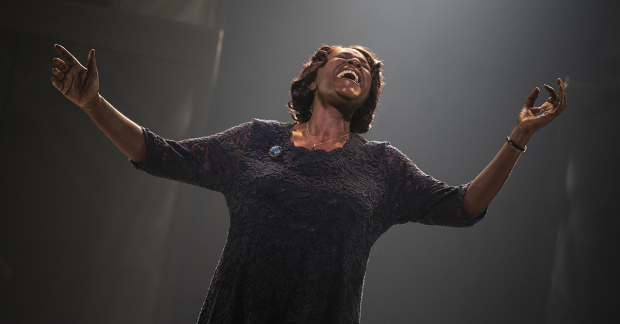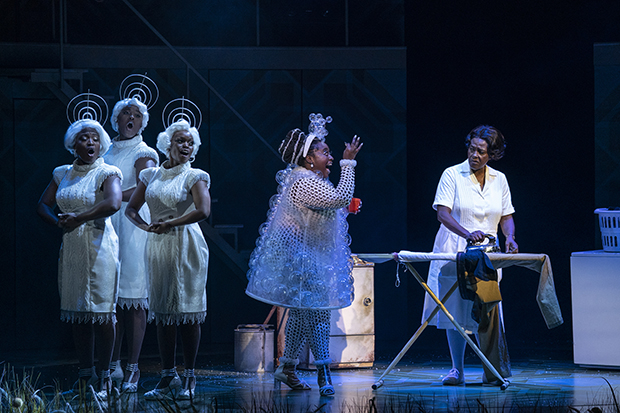Interview: Caroline Brings Sharon D. Clarke — and Change — to Broadway
Clarke stars in Tony Kushner and Jeanine Tesori’s musical at Studio 54 after winning an Olivier for her performance.
Sharon D. Clarke's Broadway debut in Caroline, or Change has been a long time coming. Clarke has been associated with Tony Kushner and Jeanine Tesori's musical since 2017, when Michael Longhurst's revival debuted at London's Chichester Festival Theatre, and now, four years, an Olivier, and a pandemic later, Clarke is the toast of Broadway at Studio 54. Here, she tells us about the experience, and what it takes to bring change to the theater.

(© Joan Marcus)
This conversation has been condensed and edited for clarity.
When you started this journey, did you ever expect it would lead you here?
No way. For me, this is the gift that keeps on giving. When we did Chichester, that was it. There was no talk of the show going on anywhere else. And then we found out that we were going to come into Hampstead, and that was cool, and then it transferred to the Playhouse in the West End, which was amazing. We thought we'd put it to bed, but then it's like, "OK, we're going to take the show to Broadway," which is such joy.
This particular story is very dear to my heart. And to bring it back to New York — you know, this is a very loved show that didn't get the run it should have the first-time round. So to be able to bring it back and to share it, especially now after the year-and-a-half that we've had with the pandemic and Black Lives Matter and George Floyd's murder. Tony wrote this story in, what was it, 2004, about change sweeping the country, and here we are again, with change coming and sweeping again. It just feels really timely and important and prescient to be telling this story.
I've never been a fan of the word relevant, but it just feels that way, even more than it would have in March 2020.
Yeah. And let's not hate the word relevant. It's a story that has been told, and is still being told, and still needs to be told. That's the hard thing for me, that we are still having to tell this story in the present. It's not a story that we can say, "This is a slice of history and we're looking back through a different lens." We're kind of looking at it through the same lens, and I think that actually having the time off has made it the right time to do the show.
How has everything that has gone on through the last year affected your performance? Has it?
I'm not sure if there are any tangible ways that I can say that it has, but just being informed as human beings of what this last year-and-a-half has been has affected all of our performances. It's just in you. Some of the anger and despair and hope and all that we've felt has to touch us in the story that we're telling. It does mean something more to us now and it's wonderful for us to be sharing it.
The thing I love about theater is being able to hold the mirror up. We're talking about change, and there's been a lot of talk about change in the world, but when does that talk move into action? We're still at a point where we're just talking. And that has to change. It has to move into action. The last year-and-a-half means nothing if we don't.

(© Joan Marcus)
How is this production making that change in the homegrown arena?
When I say that people who can make change need to make change, that's what Mike Longhurst has done. His vision for the show, how he looks at all of us interacting and telling this story, how the storytelling is very clear and reaches into people's hearts — that's about being an ally.
When allies come together to make change together…On our artistic team, we have Mike, who's a white man; Nigel Lilley, our music supervisor, who is white; Ann Yee, our choreographer, has Chinese heritage; and we have Joseph Joubert, who is so talented…I am a very proud woman at the end of the night for the audience to see that it's Joe conducting the show. That is change right there. I can't think of any shows really, especially in town, as a Black woman, where I can point to a Black conductor. All of that is change.
Tony has written this show from his heart, and wanted to share his experiences with the world. Jeanine's music encompasses…If there's a music genre and you can name it, it's here. So everybody is represented in some way, shape, and form. And I love that, because it really shows people coming together and telling stories with every weapon in their arsenal that they have.
How do you prepare yourself each night to sing "Lot's Wife"?
It's just being in the story. If I'm in the story and in the moments, then everything leads to "Lot's Wife." I'm so well fed and supported and uplifted by the wonderful company. They're just glorious and talented and generous people. All of that feeds me in the way that gets me to "Lot's Wife." I don't really have to gear change myself. If I ride that tidal wave of the show in the right way, then I am taken there.








